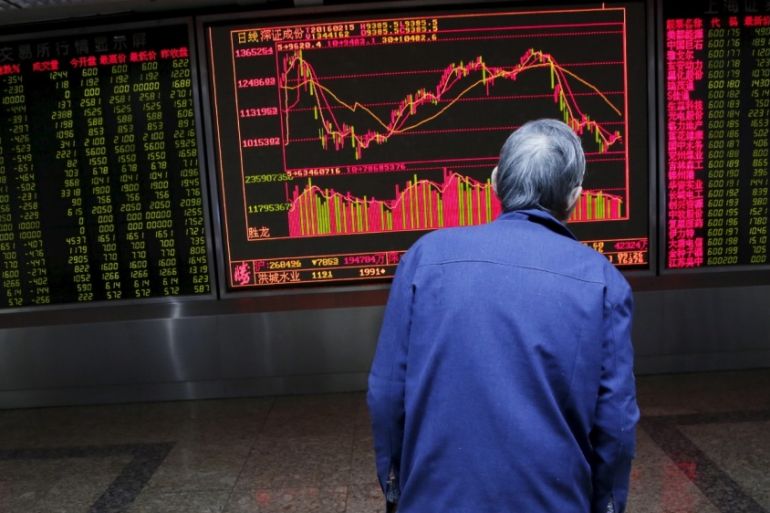Asian stocks, currencies fall sharply as coronavirus cases surge
Investors flock to gold and the US dollar after South Korea, Italy and Iran report a surge in new virus cases.

Shares and currencies across Asia slumped on Monday as the number of coronavirus infections rose sharply in South Korea, Italy and Iran, sending investors scurrying to safe havens such as gold.
Gold soared to a seven-year high while in South Korea, the won fell nearly 1 percent to its lowest since August and stocks dropped more than 3 percent.
Keep reading
list of 3 itemsNeighbours close borders with Iran as virus concerns rise
Italy towns quarantined as coronavirus cases rise
Italy, South Korea and Iran posted sharp rises in infections over the weekend. South Korea now has more than 760 cases, Italy more than 150 and Iran 43 cases.
The World Health Organization said it was worried about the growing number without any clear link to the epicentre of the outbreak in China.
“The news flow from the weekend has changed the game somewhat, where the focus is much more on the threat of an outbreak outside of China,” said Chris Weston, head of research at broker Pepperstone.
Australia’s benchmark index slid 2.2 percent while New Zealand was about 1.3 percent lower.
China’s blue-chip stocks lost 0.45 percent, leaving MSCI’s broadest index of Asia-Pacific shares outside Japan off 1.6 percent at its lowest since early February.
Japanese markets were closed for a public holiday.
“There is lots of bad news on the coronavirus front with the total number of new cases still rising,” AMP chief economist Shane Oliver wrote in a note.
“Of course, there is much uncertainty about the case data, new cases outside China still look to be trending up and the economic flow-on has further to go with the Chinese economy likely to have contracted in the March quarter.”
Chinese, Australian, New Zealand, Singapore and Taiwan currencies also retreated, with the Australian dollar carving a fresh 11-year low in early trade.
In Malaysia, political turmoil surrounding potential changes in the ruling government coalition dragged the ringgit 0.6 percent lower to its weakest since September. Malaysia’s benchmark stock exchange plunged more than 2 percent to its lowest level since 2012.
Risk aversion offered surprisingly little support to the Japanese yen, which is traditionally considered a safe-haven investment in times of volatility.
After partially recovering from last week’s drop on Friday, it traded flat at 111.55 per US dollar as Asian investors discounted its safety value owing to Japan’s virus exposure.
“The market reaction to the coronavirus appears to be evolving, beginning to differentiate the currencies vulnerable to the virus from the rest,” Barclays analysts said in a note.
“US dollar assets provide relative attractiveness,” they wrote. “In fact, our economists forecast no impact on US growth from Covid-19, with relatively few domestic incidents and a low dependency on China’s economy.”
Against a basket of currencies, the US dollar crept back towards an almost three-year peak touched last week, before soft economic data knocked it from its perch on Friday.
It was firmer against the euro at $1.0827 and pound at $1.2946. It last traded at $0.6613 per Australian dollar and $0.6324 per kiwi.
In commodities, oil prices slid as investors fretted about crude demand being pinched by the effects of the outbreak, while leading producers appeared to be in no rush to curb output.
Brent crude slumped 3 percent to $56.72 a barrel while US crude dropped 2.7 percent to $51.9 a barrel.
US gold futures climbed 1 percent to $1,665.1 an ounce. Spot gold jumped to a seven-year high of $1,678.58 an ounce after marking its biggest weekly gain last week since early August.